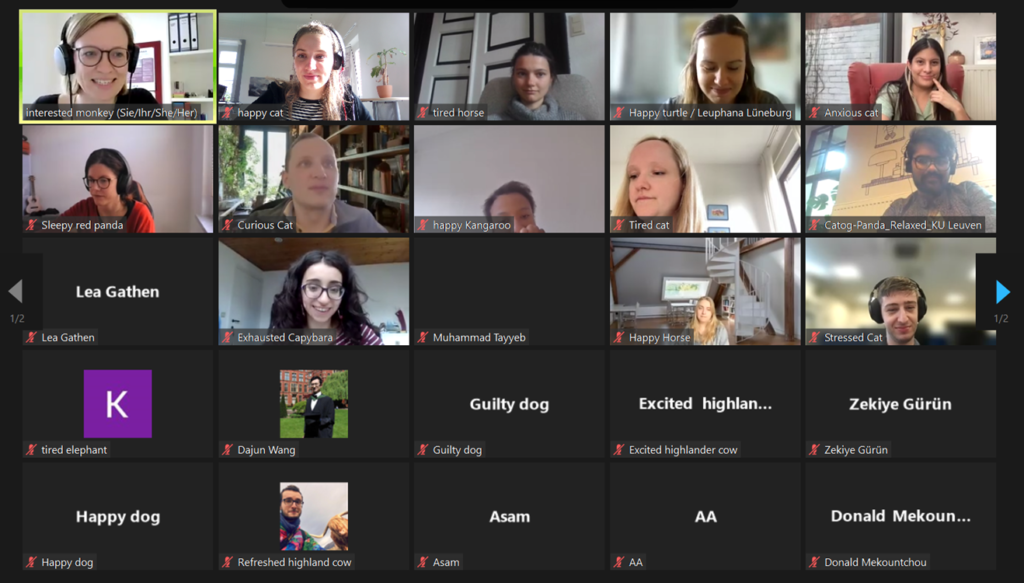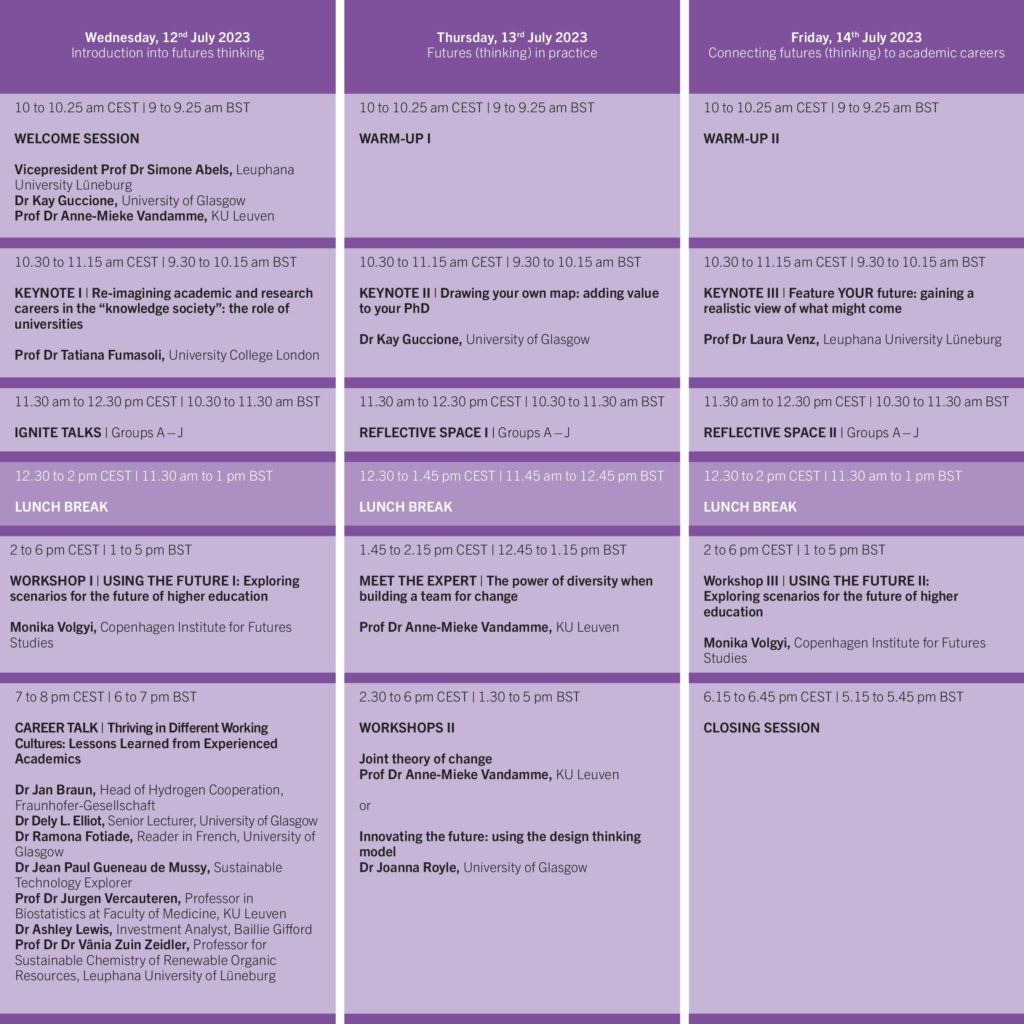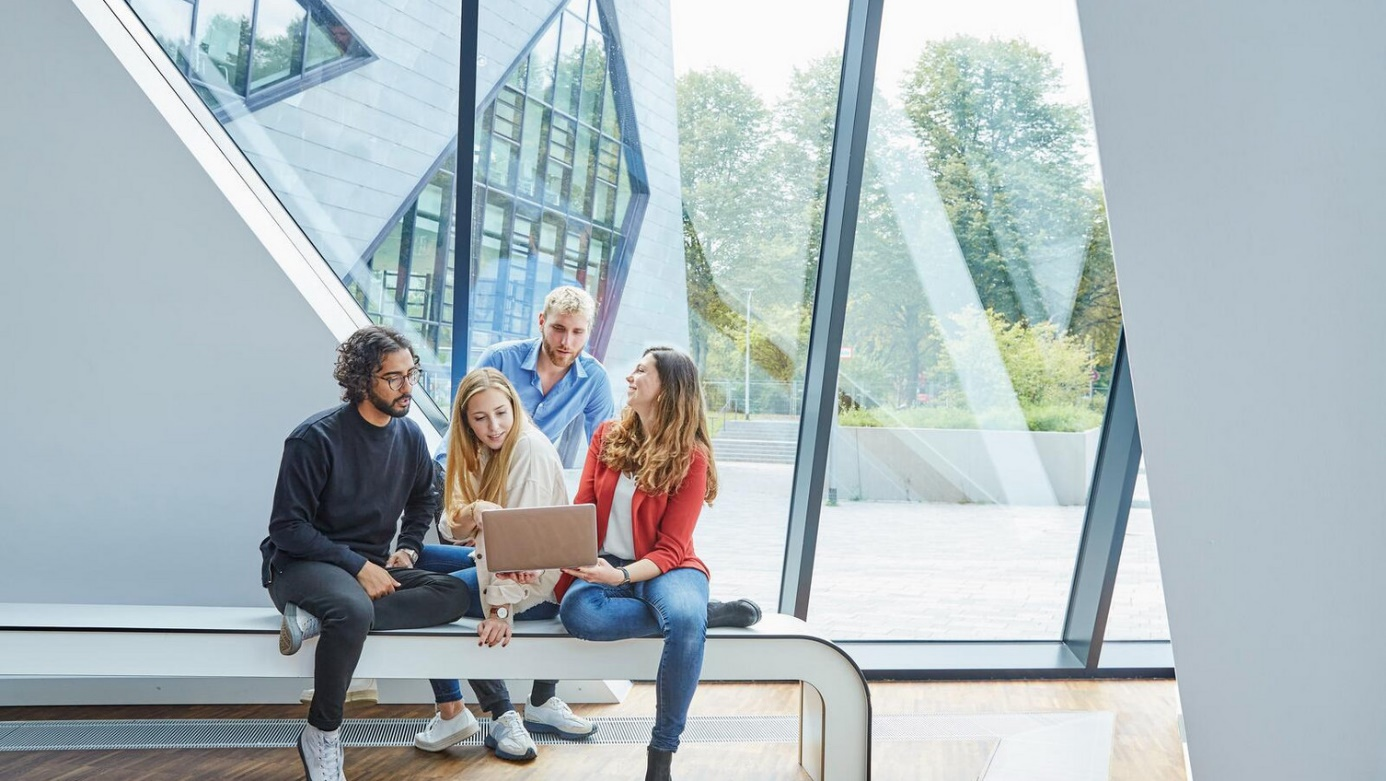Feature your future: The digital and international summer school 2023 started with an ice-breaking event in May
Von Anna Sundermann, Sophia Brumund und Vivien Pritzkow
The digital summer school 2023 | Feature your future takes place from 12-14 July 2023. This blog article provides an overview of the curriculum and idea of this year’s summer school and gives you an insight into the experiences from the ice-breaking event, which already took place on May 24.
This year, the international summer school will be held under the theme Feature your future: international career prospects for master’s students and doctoral candidates. The program focusses on the future of higher education combined with methods facilitating strategic career planning. The event aims to empower participants to make successful decisions for their personal future and career. In this regard, the summer school addresses advanced master’s students and doctoral candidates from three universities: the University of Glasgow, the KU Leuven and Leuphana University of Lüneburg.
During three intensive days, participants can expect a program with keynotes and workshops on trends in academic working environments or on methods such as scenario planning, theory of change or design thinking. Furthermore, the summer school also offers space for networking and informal personal exchange. Therefore, an ice-breaking event already took place on May 24, where the participants of the summer school could get to know each other and enter a first exchange on the future of higher education.
The ice-breaking event was characterised by a welcoming atmosphere, the integration of warm-up games, getting insights into the participants’ vision of the future of higher education, and much room for feedback. The main aim was to create commitment, excitement and a positive working environment as a base for the upcoming summer school.

What this year’s international summer school is about: Futures thinking & intercultural competencies
The primary learning objectives of the summer school are futures thinking and intercultural competence. But how are they understood in the context of this summer school?
In the context of the summer school futures thinking competencies is seen as the ability to collectively analyze, evaluate, and craft rich ‘pictures’ (e.g. images/stories) of the future related to sustainability issues and sustainability problem-solving frameworks (Wiek at al. 2011). Additionally, participants will be enabled to analyze pictures of the future including being able to comprehend and articulate their structure, key components, and dynamics. The summer schools’ program is designed to facilitate the acquisition of futures thinking competency, by collectively reflecting on the future of higher education and career perspectives across disciplines, educational levels, and different countries.
Running the international summer school completely digitally allows master’s students and doctoral candidates from three partner universities from Northern Europe to participate and to discuss the future of higher education. Speaking from different places and different points of view, it is assumed that they contribute to enrich discussions with different perspectives, share their unique experiences and in reverse benefit from the experiences of others. In addition, the digital setting enables the participation also for those who otherwise wouldn’t be able to attend the summer school and furthermore contributes to fruitful international cooperation with speakers from the United Kingdom, the Netherlands, Denmark, and Germany.
Thus, the setting is designed to facilitate the acquisition of intercultural competence. Intercultural competence encompasses skills and abilities, such as cultural self-awareness, adaptability, culture-specific knowledge, or openness to new information (Spitzberg & Changnong, 2009; Vurgun, 2016). It is assumed that the competency facilitates to act and decide effectively in an increasingly globalised society.
To sum up, the summer school aims to promote participants’ futures thinking and intercultural competencies by imparting intercultural knowledge, understanding, and communication skills, to act independently and effectively in a globalized world.
The curriculum of this year’s international summer school: content and speakers
The three days program is filled with keynotes and workshops, held by inspiring speakers.
The first day of the summer school is about gaining an overview of the situation of higher education in Europe. Complementing this, the key workshop on Wednesday offers an introduction to the method of strategic foresight and to the future trends that will shape our working environments in future. Besides, the participants will present their career ideas to each other and work out personal goals together by getting feedback from their peers. This whole day prepares them for the career talk in the evening, where they can speak with senior academics about their research and career ideas.
The second day is themed „Future thinking in practice“: In the morning, the ideas and results of the first day will be enriched with informal advice on navigating through academic work environments and there will be plenty of time to review and reflect on the content of the first day together. In the afternoon, workshops on two additional future-oriented methods will be offered: Participants have the choice to engage in either creating a Theory of Change or learning about Design Thinking. Both are methods that originate from practice and will become important in the future to develop interdisciplinary solutions under uncertainty.
The last day refers to the YOU in „Feature your future“. This day is all about the next steps after the summer school – both in the keynote and in the „Using the Future“-workshop. Learners are guided to think precisely about how they will use both, the content and the methods taught in summer school, to actively and successfully plan their future.

International summer school program 2023.
Looking Forward to the summer school in July
The ice-breaking event on May 24 was a successful start of this year’s summer school and a great opportunity for everybody to get to know each other and to gain a first insight into the summer school. The participants appreciated the “relaxing and friendly atmosphere” and the time and space to get in touch with each other before the summer school itself starts.
Lea, a doctoral candidate from Leuphana University who attended the ice-breaking event, says:
“The ice-breaking event was a great opportunity for everyone to connect with their respective groups and get to know each other in a fun way, that enabled deeper conversations about PhD and Master thesis topics. Looking forward to the upcoming events.” (Lea, 06.06.2023)
For now, everybody is looking forward to the summer school itself in July.
Further information about the international summer school you can find on: https://www.leuphana.de/en/graduate-school/summer-school.html
References
Spitzberg, B. H., & Changnong, G. (2009). Conceptualizing Intercultural Competence. In D. K.
Deardorff (Ed.), The SAGE Handbook of Intercultural Competence. SAGE.
Vurgun, S. (Ed.). (2016). UniWiND-Publikationen: Vol. 6. Kompetenzen von
Nachwuchswissenschaftlerinnen und Nachwuchswissenschaftlern: Entwicklung eines
Kompetenzmodells. https://www.uniwind.org/fileadmin/user_upload/Publikationen/2016_UniWiND_Bd6_A5_web.pdf
Wiek, A., Withycombe, L. & Redman, C.L. (2011). Key competencies in sustainability: a reference
framework for academic program development. Sustain Sci 6, 203–218.
https://doi.org/10.1007/s11625-011-0132-6


